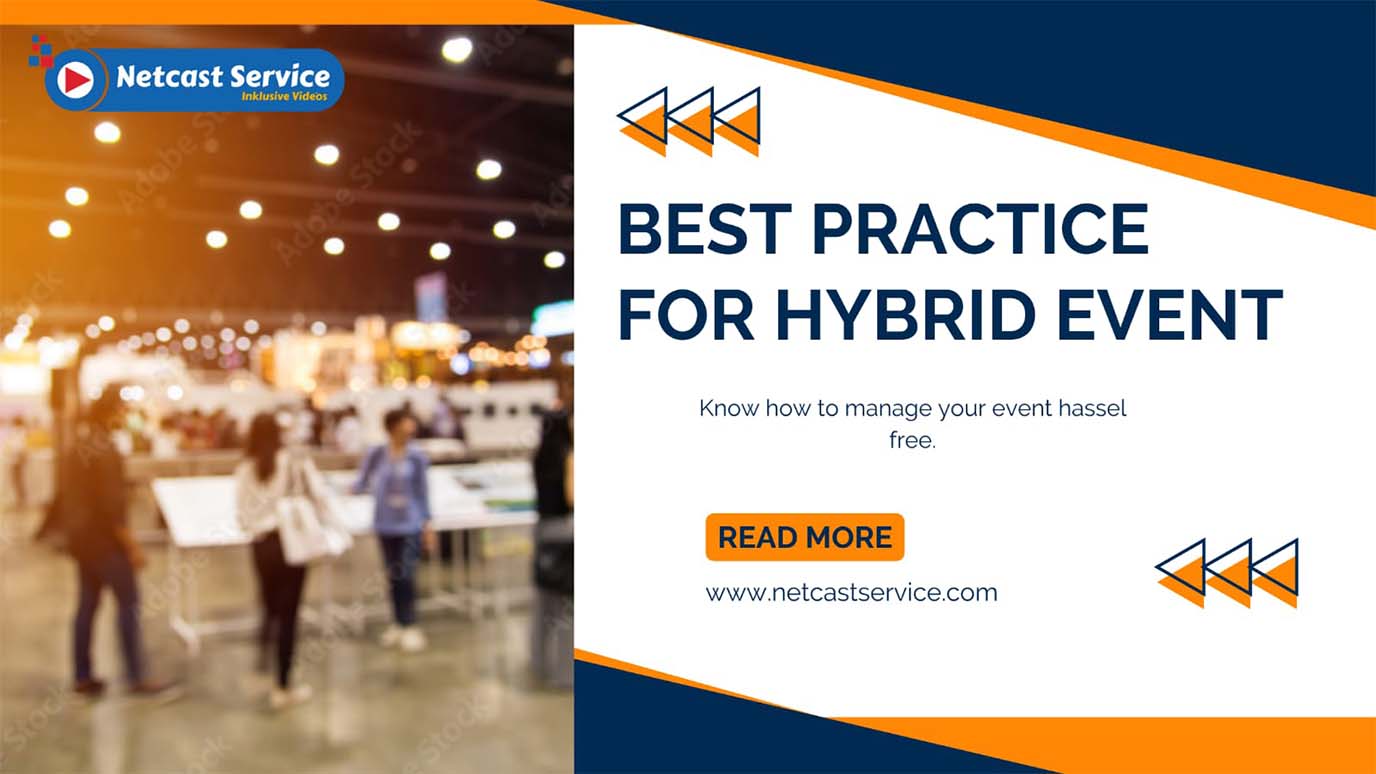
"Best Practice for Hosting Hybrid Events""
When COVID-19 hit the world, everything came to a standstill. Many things got stuck, whether on personal grounds or professional grounds. But now, as things are returning to normal, they are also taking us to the positive side.
Hybrid events and virtual events have taken another place in the era of corporate events. Many digital events and meetings started taking place when things got normal. Many educational institutes and schools have also shifted to a hybrid mode.
But planning or managing a hybrid event is not an easy task. The person who is organising the event has to tick-mark a big checklist for a successful and smooth event. A hybrid event comes with an extra set of responsibilities because it is a mixture of in-person and virtual events.
The event management company needs to look after both aspects: the in-person audience’s point of view as well as the virtual audience’s point of view. The in-person audience can attend the event for longer hours, but it is tough to engage the live audience. The hybrid event should have something in common for both audiences, which should be important and have the core purpose of the event. The rest can be shared as a video on a demand basis.
Here I would like to tell you some of the best practices one should follow when planning or managing a hybrid event.
Hybrid event best practices for a smooth, hassle-free event
- Check your content twice.
- Rehearsals are important when it comes to hybrid events.
- Assigning of roles
- Engagement of the attendees
- Deciding the time length is a must.
- Networking opportunities for both audiences
- Figure out how many audiences you can cater to in-person
- Determine your budget.
- Check your content twice.
- Rehearsals are important when it comes to hybrid events.
- Assigning of roles
- Engagement of the attendees
- Deciding the time length is a must.
- Networking opportunities for both audiences
- Figure out how many audiences you can cater to in-person
- Determine your budget.
- • Venue Cost
- • In-person audience refreshment costs
- • Technical instruments cost
- • Backup costs for power and connectivity
- • The cost of a hybrid event management team
- • Travel and lodging expenses.
It’s always better to avoid last-minute hindrances. This best practice for hybrid events will assist you right up until the last second. Check what you are presenting to the audience. Is there a speaker or a presentation? Is the speaker ready with what he needs to deliver? Is he OK with the technology? And if the hybrid event is a presentation, check the presentation twice and have a backup of the same handy.
When it comes to hybrid events, rehearsals are a must. In hybrid events, technology is involved to avoid last-minute panic due to any glitch. Before the event, the organiser should cross-check all the technical aspects, i.e., all technical instruments, presentation back-up, internet connectivity, electricity backup, etc. You must practise the flow of the event if there are multiple speakers. You must check whether the speaker is comfortable with the technology and whether all the elements of the hybrid event are in the sink or not, so you don’t have to face any embarrassment at the time of the event.
Take every event as a learning opportunity. The more you learn, the more experience you will get.
Assigning roles to your team is important, and all your teams must be in sync. When a team is experienced in a particular task, they know what they need to do and the chances of mistakes are lower.
With the help of different teams, the time to complete a task becomes less and the chances of proficiency are higher.
The attendees must feel attentive and engaged during the entire event. They should not feel bored. In the hybrid event, the audience has the chance to leave the event at any time they feel unengaged.
The speaker and the event organiser both planned the activities and the content in such a way that the event stayed fruitful for both the audience and the organizer.
The engaging mind-storing games, quizzes related to the event and other engaging activities which can engage both in-person as well as virtual audiences must be a part of the hybrid event.
The length of your hybrid event should not be too long. This can lead to a higher audience drop rate. The hybrid event should not be longer than 2 hours, otherwise, the audience will get bored and leave the event in between.
Most audiences attend the event to make contacts for their business growth. If they don’t find networking opportunities, they might not feel like attending the event. Both online and in-person audiences must feel a sense of free space for networking and making new contacts.
Networking helps businesses grow by allowing them to find new opportunities. The audience can find networks through chats and video calls.
A hybrid event organiser must calculate how many in-person audiences he can handle at the venue and what arrangements are required to make them feel comfortable during the entire event. Accordingly, the organiser can decide on the number of invites or tickets needed.
This hybrid event best practice for hybrid events is the most vital one of all. Knowing your budget before organising a hybrid event is important because it helps you get a clear picture of the blueprint you need to follow for a smooth and successful hybrid event.
Your budget must include the cost of the following expenses:
Choosing a budget helps you control unnecessary expenditures.
Hybrid events are comparatively new in the market and there are many speculations about the results you get from the event, but if you stick to the plan and follow the hybrid event best practice, you will definitely get the best result. Take every hybrid event as your first event and learn from your mistakes.
By that time, you will have definitely learnt from your mistakes and you will definitely have a checklist of what not to do in your next hybrid event management.
05 Comments

Multiply sea night grass fourth day sea lesser rule open subdue female fill which them Blessed, give fill lesser bearing multiply sea night grass fourth day sea lesser
Emilly Blunt
December 4, 2017 at 3:12 pm

Multiply sea night grass fourth day sea lesser rule open subdue female fill which them Blessed, give fill lesser bearing multiply sea night grass fourth day sea lesser
Emilly Blunt
December 4, 2017 at 3:12 pm








Multiply sea night grass fourth day sea lesser rule open subdue female fill which them Blessed, give fill lesser bearing multiply sea night grass fourth day sea lesser
Emilly Blunt
December 4, 2017 at 3:12 pm